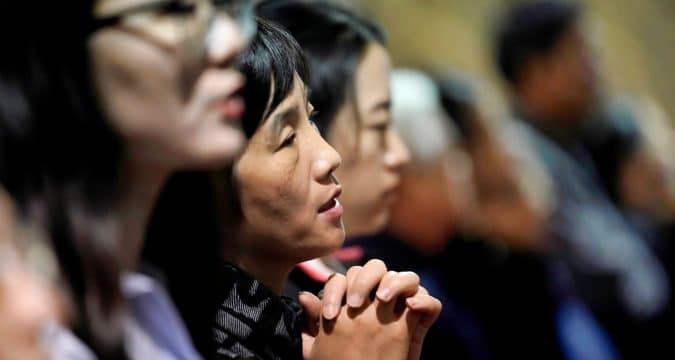
Aleading academic in Hong Kong says the Chinese government is attempting to tighten even further its control over religious groups.
Professor Ying Fuk-tsang, director of the divinity school of Chung Chi College at the Chinese University of Hong Kong, has spoken at length about a consultation paper, Measures for the Administration of Religious Groups (Draft for Solicitation of Comments), published on August 28 by Beijing’s State Administration for Religious Affairs (SARA).
The document outlines various proposals for how registered religious groups would be allowed to operate in future and called for public comments to be submitted by September 27.
These new management measures represented nothing other than an attempt by the authorities to further strengthen their control over the groups, Ying said.
The document candidly says that the authorities intended to regulate the management of religious groups and actively guide them to adapt to China’s socialist society in a way that promoted their healthy development.
It has 41 Articles and six chapters. They are General Provisions, Organisational Structure of a Religious Group, Functions of a Religious Group, Oversight and Management, Legal Responsibility and Supplementary Provisions.
Ying said that in the past, the administration of religious groups had mainly been based on the Regulations on Registration and Administration of Social Organisations (1991, 1998, 2016 Revised) and Implementing Measures on the Administration of the Registration of Religious Social Organisations (Measures) in 1991.
He said the authorities were now trying to devise new ways of managing religious groups, as shown by their revisions to the Regulations on Religious Affairs, the development of the work on religions by the Chinese Communist Party (CCP), as well as the revision of the Regulations on the Registration and Administration of Social Organisation in 2016.
Ying said that the management of religious venues was being treated differently from that of religious groups and paid little attention to provincial regulations.
He also said the new regulations would have no impact on unofficial religious groups because they had not been offered any legal status and so were irrelevant. Instead, they would strengthen the control on registered religious groups only.
Xi’s firm control
Article 5 of the document instructs that (religious groups) must “follow the leadership of the Communist Party of China”, “persist in the direction of Sinicisation of religion … and practice core socialist values.” This, Ying said, fit the key points emphasised by China’s president, Xi Jinping, on how he wants religious affairs managed.
The content of the consultation paper, he said, maintains groups’ “double registration” with both the business supervisory unit and the civil affairs department, meaning “there is absolutely no relaxation on the threshold for the establishment of religious groups, but rather a further strengthening of control.”
The academic explained that the Religious Affairs department was linked with the business supervisory unit and religious groups must accept its “guidance, supervision and administration” (Article 6).
However, he wondered what business guidance really meant and whether it would translate into a new kind of intervention in the autonomy of religious groups.
Moreover, he also referred to Oversight and Management, as mentioned in Chapter 4, which details what needs “supervision and approval” and which businesses would be required to file written reports.
He referenced the authorities’ new power to regulate religious groups’ financial accounting and said this cemented his view that they were seeking comprehensive control on their daily operations.
The professor mentioned two Articles 5 and 17 in the consultation document, saying that they showed the authorities intended to view religious groups as political bodies rather than civil ones.
Regarding Article 14, which clearly stipulates that religious groups must not set up regional branches, Ying pointed out that although there are two national conferences, two provincial conferences and two municipal conferences, the organisations in provinces are not the branches of the national entities, while the bodies in cities are not the branches of the provincial organisations.
He explained: “This is ‘territorial management’ by the CCP, which means religious groups at all levels are managed by the party at every level. The purpose is to prevent religious groups from becoming civic organisations from top to bottom and detached from their regions. Everything is under the leadership and control of the CCP.”
Ying also stressed that Articles 20 and 21, which mention guidance in the way religious groups are allowed to operate, confirm religious groups will have no real power at all and can only guide religious institutions and religious venues.
“Of course, the only one who will really be able to exercise power is the (Communist) Party,” he added.
Ying noted that according to Article 23, an important function of religious groups was “to designate religious professionals” but he believed that this section of the document would also require groups to submit reports to the Religious Affairs Department for their “record-keeping.”
Previously, SARA also issued a number of regulations regarding the keeping of records of groups’ religious personnel. This was yet another means of ensuring control by the party, he said.
One rule, dating back to 1991, stipulates that “no identical or similar religious social groups may be established in the same administrative region” and although it is not mentioned in the current document, similar requirements are still in place in the Regulations on the Registration and Administration of Social Organisation (Article 12: 2) revised in 2016.
Ying said, “So it is still forbidden to establish religious groups, other than patriotic ones.”
He called the consultation paper a brazen attempt to comprehensively strengthen Beijing’s control over religious groups and to reflect Xi Jinping’s overall control over civil society.
Even government-sanctioned religious groups would have to accept the CCP’s tight control, Ying added. UCAN










